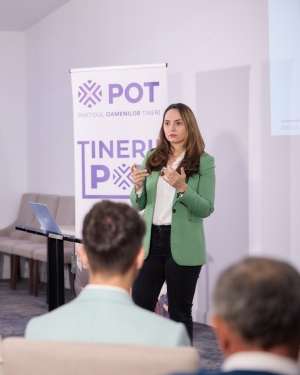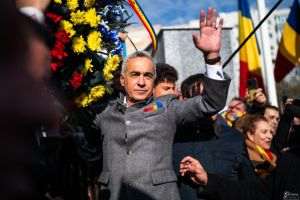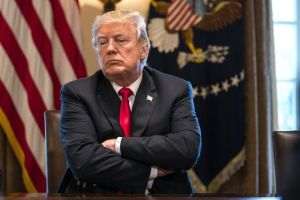România nu poate fi intimidată din punctul de vedere al securităţii, fiind parte a celei mai mari alianţe militare defensive din lume, "a unui sistem de descurajare foarte solid", a transmis miercuri preşedintele Senatului, Nicolae Ciucă, la deschiderea Expoziţiei internaţionale Black Sea Defense and Aerospace - BSDA 2024, informează Agerpres.
"Avem umbrela de securitate a NATO, dar trebuie să ne facem datoria cât mai bine ca parteneri ai Alianţei în anii care vin. Faptul că suntem pe Flancul Estic al NATO ne obligă la vigilenţă mai mare pe termen mediu şi lung. Va trebui - probabil - să trăim ani de zile cu o Rusie agresivă în proximitate. Vom trăi în continuare cu ameninţări hibride, care vor căuta să ne slăbească sau să ne reducă încrederea în forţele noastre şi în parteneriatele pe care le avem. Pentru a face faţă cu bine acestei provocări pe termen lung nu e suficient să investim doar în apărare, ci trebuie de asemenea să întărim democraţia românească", a declarat Nicolae Ciucă.
El a adăugat că radicalismul politic rămâne o problemă pentru România.
"Radicalismul politic rămâne o problemă pentru România, fiindcă slăbeşte coeziunea socială. Vocile din România care atacă Uniunea Europeană, care-i atacă pe aliaţii noştri occidentali fac un serviciu Rusiei. Siguranţa României e o chestiune extrem de importantă, care porneşte de la responsabilitatea forţelor politice şi a tuturor românilor". a susţinut Ciucă.
Preşedintele Senatului a subliniat că în toată Europa există o dezbatere extinsă despre regândirea paradigmei de securitate pe vechiul continent şi despre nevoia de a investi în apărare pentru a ne proteja cetăţenii, iar România a înţeles acest lucru încă din 2015.
"Încă din 2015 România a înţeles că trebuie să fie nu doar un beneficiar, ci şi un furnizor de securitate, în primul rând pentru sine şi apoi în regiune. Prin consensul tuturor actorilor politici, bugetul alocat apărării a crescut la 2% din PIB. Acest procent a crescut din nou la 2,5%. Este important ca o parte din aceste fonduri să fie utilizată inclusiv pentru restartarea industriei de apărare. Avem cel puţin câteva veşti bune în acest sens. În primul rând avem buni specialişti, apreciaţi în zona tehnică şi de expertiză militară, instruiţi inclusiv în cadrul NATO şi în cadrul relaţiilor bilaterale din parteneriatele strategice pe care ţara noastră le are. În al doilea rând, România a avut o tradiţie pe zona industriei de apărare, pe care începe să o reia şi pe care o poate valorifica rapid. Recent s-au făcut paşi în direcţia bună, pe care i-am încurajat şi din postura de ministru al Apărării şi din cea de premier. Mă refer la parteneriate şi contracte importante pentru industria de apărare", a afirmat Nicolae Ciucă.
Tot la capitolul investiţii, preşedintele Senatului s-a referit la centrul de întreţinere, reparaţii şi revizii pentru elicopterele S-70 Black Hawk, precum şi la anunţul companiei coreene Hanwha Aerospace de a înfiinţa în România un hub industrial pentru Europa, dar şi la investiţii în cercetare, inovare şi achiziţii de tehnică militară.
"Pentru viitor, cred că trebuie să investim în educaţia superioară pentru a creşte specialişti în producerea de tehnică militară. Trebuie să stimulăm importul de know-how prin parteneriatele pe care le dezvoltăm cu statele membre NATO. (...) Trebuie să transpunem în legislaţie actualizată şi adaptată prevederile Strategiei Naţionale de Apărare a Ţării cu privire la Direcţiile de acţiuni şi modalităţile pentru asigurarea securităţii naţionale. O parte din bugetul apărării trebuie dedicat cercetării şi inovării - cel puţin 2%, aşa cum 20% trebuie dedicat achiziţiei de tehnică militară", a punctat Ciucă.





























































1. Cistigatorul
(mesaj trimis de esop în data de 22.05.2024, 12:57)
Cistigatorul
(mesaj trimis de esop în data de 22.05.2024, 12:48)
Ucraina are tot ceea ce ii trebuie .Ceea ce nu are inca Ucraina este ceea ce am putea numi „Acceptul” .Ucraina are un numar extrem de mare de militari antrenati in Occident . Ucraina primeste nu numai resursele necesare spre a face fata razboiuluii dar are deja toate echipamentele disponibile in cazul in care se trece la contraatac .Deocamdata vedem ca se intimpla ceea ce orisicare cunoscator in materie de contraofensiva stie ca ar trebui sa se intimple .Ucraina loveste depozitele de armament , bazele militare de importanta si rafinariile din proximitatea frontului .Curind rusii nu isi vor mai putea aduce nici gamela cu fasole pe front . Nu vor mai putea aproviziona frontul .Germania inca nu le permite ucrainienilor sa loveasca devastator Rusia .Sistemele Patriot sunt deocamdata folosite doar pentru aparare iar rahetele Taurus sunt inca tinute ca rezerva .Deocamdata , pina ce intreaga granita de la nord la sud aflata in estul Europei nu va fi inarmata cu sistemelle Iris IT si cu capacitatile nucleare ale francilor si pina ce nu se vor fi terminat alegerile din UE si SUA , Ucraina doar se va apara respectind un principiu militar simplu .Doi pasi inainte doi pasi inapoi facuti cu buna stiinta pe masura ce dispar capacitatile adversarului de aprovizionare a frontului .Tancurile si blindatele sunt inca in rezerva ca si avioanele F16 ce deja depasesc 150 de bucati . Momentul zero il reprezinta distrugerea tuturor componetelor militate de atac din Crimeea ocupata . Rusia s-a impotmolit .In Marea Neagra au fost retrase toate „barcazurile” rusilor ale de aveau rachetele de sfidau legile fizicii .Mareata armata a Rusiei nu are curajul sa loveasca nici o natiune membra NATO si se chinuie de 2,5 ani in Ucraina .Halal imperiu sovietic .Romania si Ucraina devin militar un intreg ceea ce ne pozitioneza ca o forta demna de luat in seama .Vecinilor nostri filorusi le tremura deja „izmenele” .”Ginditorul si fauritorul” Iohannis ne-a propulsat in elita fortelor militare est europene avind drept reper pe cel care va deveni Presedintele natiunii denumit si redenumit ca si „romanul absolut ” Nicolae Ciuca .
1.1. fără titlu (răspuns la opinia nr. 1)
(mesaj trimis de anonim în data de 22.05.2024, 13:21)
Cat mai merge o postare de 300 cuvinte ?
1.2. fără titlu (răspuns la opinia nr. 1)
(mesaj trimis de anonim în data de 22.05.2024, 13:21)
frumoasa poveste... intre timp Rusii au mai AVANSAT pe Front;
600 bil rezerv usd Rusnica... 60 bil rezev USD Ucrainica... plus ca are si NPLuri bomba ce se chinuie sa le coboare...
povestesti frumos dar nu incluzi toate datele de pe teren....
Rusnacul isi face pur si simplu rodaj la vechituri... nu se arunca cu nou... asteapta sa vada ce si cum... plus ca sa o spunem drept Rusnacul a luat deja teritoriu Ucrainean cu fiare vechi la lupta... in schimb Ucrainai nici nu reuseste sa ii dea in spate prea mult.
Aici e razboi de 4-8 ani... daca vor sa nu o joace cu bombe atonice sau altele neconventionale...plus ca sunt cat se poate de sigur ca Rusia nu Va mai da Crimeaa inapoi!
E dispusa sa lanseze si atonice ... ca sa demonstreze punctul de vedere sustinut.
Ucraina sa faca cum poate sa ii dea in spate cel putin sa castige acces mai mare la MArea Neagra si sa aibe control pe raul respectiv.
s c c r e t
1.3. fără titlu (răspuns la opinia nr. 1.2)
(mesaj trimis de anonim în data de 22.05.2024, 13:44)
care rezerve la rusi, alea ce-s 300 miliarde blocate in vest, si restul o parte s-au dus pe razboi, si o parte mare in aur. aurul ma gandesc ca nu-l vand sau cine stie.
rezervele Ucrainei nu conteaza, ca nu-si pot finanta singuri razboiul oricum.
1.4. fără titlu (răspuns la opinia nr. 1.3)
(mesaj trimis de anonim în data de 22.05.2024, 15:46)
asa o dam si ca rezervele rusiei nu conteaza..ca are China credit pe alt canal pt ei...si alti "sirieni libanezi etc..."..
s c c r e t
1.5. fără titlu (răspuns la opinia nr. 1.3)
(mesaj trimis de anonim în data de 22.05.2024, 15:48)
Puteți contribui prin adăugarea de referințe în vederea susținerii bibliografice a afirmațiilor pe care le conține. Un bilion, în majoritatea țărilor Europei, înseamnă un milion de milioane (10la putere12), sau o mie de miliarde.
s c c r e t
2. fără titlu
(mesaj trimis de ferencz în data de 22.05.2024, 13:21)
A se citi: securistii romani nu pot fi intimidati, sunt in alianta cu Hunter Biden. Popoviciu stie.
Il asteptam pe Taticul Nostru, la Rompetrol, sa inceapa odata filmul Ucraina2.
3. fără titlu
(mesaj trimis de anonim în data de 22.05.2024, 13:40)
teoretic e bine, dc tot cheltuim niste bani pe aparare, sa facem niste fabrici de armament romanesc, niste locuri de munca , PIB , taxe. numai sa nu devina alte gauri negre pt baietii destepti
4. fără titlu
(mesaj trimis de Ionut în data de 22.05.2024, 14:08)
Asta-i jeneral cu 4 stele,erou cica prin Afganistan.uitati-va bine la fata lui si raspundeti fiecare daca Romania poate fi intimidata sau nu si daca va simtiti in siguranta cu astfel de specimene in fruntea tarii.
5. Si Constitutia are nevoie de un upgrade
(mesaj trimis de Opinie în data de 22.05.2024, 17:09)
Trebuie reintrodusa posibilitatea presedintelui sa demita guvernul, cand si cum se fac alegeri anticipate, atributiile presedintelui si care sunt verificarile si competentele pentru responsabilizarea presedintelui, premierului etc. Si trebuie intarita si democratia participativa prin introducerea referendumurilor de demitere pt principalii actori politici :adica cu niste conditii de organizare fezabile astfel ca poporul sa participe mai activ si in continuitate la politicile promovate, in special in problemele grave cum e implicarea in razboaie etc Noi cetatenii obisnuiti suntem ingrijorati si nemultumiti de politicile Romaniei din ultimii 30 de ani, de la privatizarile ruinatoare la actuala cedare a suveranitatii si a controlului armatei. Cei care promoveaza razboiul sa spuna acum in campanie electorala, daca nu, nici sa nu mai paduca vorba de razboi!
6. fără titlu
(mesaj trimis de anonim în data de 22.05.2024, 23:25)
Trebuie să regândim securitatea dintr-o perspectivă feministă și să imaginăm noi politici și strategii la nivel european și național. În acest context, oportunitatea formulării unor politici eficiente care să abordeze securitatea umană în cadrul guvernanței globale umane, potențialul abordării anti-hegemonice a societății civile europene, divergentă într-o perspectivă neo-gramsciană, dar cu abordări convergente ale guvernanței globale din perspectiva Comisiei pentru Guvernanță Globală. (Deși Comisia oferă imaginea că guvernanța globală este cumva o sumă a acțiunilor tuturor participanților, procesul a apărut de fapt ca un conflict între agenda elitistă „de sus în jos” și agenda populară „de jos în sus”).
7. fără titlu
(mesaj trimis de anonim în data de 22.05.2024, 23:30)
A Challenging project of Global Humane governance for sustainable development opportunity
ph.d. Salomeea Romanescu
This chapter would like to introduce concepts as Humane security, sustainable development and humane governance able to curb the ignored threats, in a feminin perspective.
3.1.New humane security paradigm as a common denominator of all European actors against common challenges
This subchapter deals with the concept of Humane security and his potential positive impact on the quality of life; first section put the security redefinition need in the international context, second tries to define humane security and third shows the importance of humane security in transforming the losers of European Integration in winners, as a potential modality for a positive scenarios of Integration, as win-win game.
“World politics should not be viewed as a historically frozen process of power-hungry states, but rather as a dynamic process of interaction among individuals, groups, states and international institutions, all of which are capable of adapting their sense of self-interest.”1
After the Cold War the militarised conception of security was challenged by multifaceted and holistic conceptions like humane security, concept which lacks a clear definition and any agreed upon measures on it. We have to notice that the Military security failed to ensure the territorial security of a nation-state. The collapse of so called communism and of Soviet hegemony in Central and Eastern Europe, removed the immediate military threat. The replacement of the major military threats fr om the East by the multilevel and multidimensional threats has lent great instability to the European Security System, which was not prepared to deal with it, in term of competences, policies and institutions. (See annex 2 for the collective risks of globalization.)
Because Europeans face so many security challenges and promising opportunities, all of which compete for higher attention and resources, it will be difficult to deal with non-traditional threats. However, some of them will not be ignored for long time. Individual security can no longer be satisfied only through military measures; it needs multidimensional understanding.
Humane Security is difficult to be achieved in actual existing international system mainly dominated by sovereign states. A current state - centred system has been inadequate to provide security and welfare as we have analysed in the first and second chapter. Nation states risk losing their external and internal sovereignty. In our logic of humane security nation states have to reorder priorities, problem is what criteria? These could be: The sovereignty of the Human Person, Participation in decision- making and Response to Unmet Human Needs.
The following issues needs the priority of governments and international organisations:
Hunger, housing, health care, education, employment, environment, war prevention, crime prevention, care of the aged, racial justice, women’s rights, religious freedom, penal reform, urban planning, population, democratic participation, prevention of alienation and addiction.
Most of the leaders would insist that they personally embrace the above agenda. Pragmatically, however, these issues are subordinated to national security priorities. In the present world system, national policies developed primarily around the above criteria would threaten the ability of their nations to survive.
The lights of Humane development will remain out for a majority of humankind until the emergence of a world-order system. It is important to emphasize that we are not advocating constant mobilization for national security. It is rather a question of recognizing the reality that present corporate priorities and elite rule are not primarily due to ideologicalo rpersonal demons. The world does not need more demonology. What is needed is objectivity - not the rationalize fatalistic acceptance of the status quo, but to identify the all sources of powerlessness: of leaders as well as of citizens. The surest way to entrench the status quo is to focus too exclusively on the powerlessness of the people and to rely on demonology at the cost of a more holistic analysis.
The definition of security issues, the way in which they were analyzed and the policies that resulted were the fruits of the dominant geopolitical and ideological atmosphere during the Cold War period. Security concept has a strong political base and it changes according to it
Security continues to be calculated by the degree of “destructive capacity possessed in relation to an expected enemy. “The achievement of security in a global setting is largely reduced to the management of boundaries of the territorial state- the degree of capacity to keep unwanted persons, ideas, things out, and to keep what is wanted within.
To extent that security is globalised, it is associated with establishing the conditions that best enable the expansion of gross planetary product and stimulate the growth of world trade within a framework stabilized by policies that produce the triple indictment”
What is remarkable about this geopolitical image of security is its durability, one that traverses the distinction drawn earlier between modern, state-centric geopolitics and post-modern market-geared geopolitics. The absence of critical self-reflection is terrible. What needs to be ackn owledged here, among other challenging perspectives, is the relevance of feminist voices fr om around the world in fashioning other possible responses to the actual. The revision of security is crucial to the all enterprises of global civil society and the shaping of the global polity in accordance with the criteria of humane governance.
Subrahmanyam clearly identifies this element of necessity in the following passage:
“Either humanity unites to survive,o rit is bound to face a bleak future. The strategy of a non-violent and nuclear free world has no alternative, if future generations are to survive in condition of sustainable development. We of this generation have to stark choice before us. Either we become saviours of our posterityo rits executioners. Either we opt for lifeo rshatter the future of mankind.”
This sense of urgency is here affirmed. Also to be underscored in the idea that continued democratisation depends on the establishment of a security, which radically breaks with perceptions and practices that have given substance to geopolitics throughout modern history.
It is obvious that to initiate a discussion of security on this radical note is to highlight the distance separating such a position fr om the mainstream thought in the North and fr om the outlook of most governing elites in the South. And it is equally predictable that it will be dismissed thereby as “utopian”. To respond helpfully to the challenge ahead it is necessary to summon the intellectual and political courage to face the depth and extent of the problem that faces humanity.
What, exactly, is meant by the term humane security and why humane security is so important in a optimist scenarious of Integration. What is humane security? «There are two basic aspects to humane security - freedom fr om fear and freedom fr om want. Freedom fr om want is no less important than freedom fr om fear because his objectives are to ensure the survival and dignity of individuals as human beings. The epoch-making 1994 UNDP Development Report discussed the concept of human security in depth, and identified seven main categories of human security – economic security (or freedom fr om poverty); food security (freedom fr om hunger), health security (freedom fr om disease), environmental security (the availability of clean water and air, for example), personal security (freedom fr om fear of violence, crimes, drugs), community security (freedom to participate in family life and one's ethnic group), and political security (freedom to exercise one's basic human rights)».
Why is humane security important for the optimistic scenarious of Integration? What is the trend in Europe regarding the social fracture of Globalisation? Any balanced view, the Europe success was supported by social settlments that allowed equity and efficiency. Employment relations institutions and process associated with this model of development are under strain. They suffer of crises of economic functionality and out of line with new emerging patterns of economic and social life. Despite the social forces that identify themselfs with values of The European social model (see annex 8a) there is a tendency to defend inherited institutions rather than to construct new forms of social solidarity compatible with the complexity of modern economic life. In his book Paul Teague points out that “any innovations need to address three important themes: the democratization of the EU, the future association between the nation-state and economic citizenship; and the institutional reform of the labour-market governance".( see annex 8b)
In a stark prediction European Governments will soon have to choose between a free market and free society with the top concern about social justice, by placing the organisation of society secondary to business activity may not be an efficient model of economic competition. The political game between neo-liberal Europe and Social Europe is still on. The key benchmarks, which could test if human security has been revived, would be: lower unemployment, better labour market access and more democratic and participatory work places. Some humane security concerns can no longer be kept hidden fr om critical scrutiny. The performance of governments and international organisations will be judged increasingly by the extent to which they seriously and effectively deal with humane security concerns. We hope that Europe could marry again, economic efficiency with social justice, in a feminin perspective different of masculin anglo-saxon perspective.
3.2.Sustainable development as a common denominator for all European Actors and new opportunity
First section of this subchapter will make an anthology of the actual trends of defining sustainable development in contrast with development concept used in standard economic theory, actual position of EU concerning sustainable development and the implications of it for the employment in Europe and finally participation as an important aspect of sustainable development. We have chosen to do it by using Internet resources and relevant literature. We will try to make a synthesis of all of them for economic reasons. (see annex 9)
In standard economic theory, Development implies both quantitative change (growth in Gross Domestic Product) and qualitative change (transformation fr om a pre-capitalist economy based on agriculture to a capitalist industrial economy) etc. Theory of sustainable development involves both a critic of quantitative GDP measure and a different view of qualitative transformation. The goals of sustainable development include a harmonization of economic, social and environmental goals:
Economic - an economically sustainable system must be able to produce goods and services on a continuing basis, to maintain manageable levels of government and external debt, and avoid extreme sector imbalances that damage agricultureo rindustrial production.
Environmental - an environmentally sustainable system must maintain a stable resource base, avoiding overexploitation of renewable resources systemso renvironmental sink functions and depleting non renewable resources only to the extent that investment is made in adequate substitutes: this include maintenance of biodiversity, atmospheric stability, and other ecosystem functions not ordinarily classed as economic resources.
Social - a socially sustainable system must achieve fairness in distribution and opportunity, adequate provision of social services, including health, including health and education, gender equality, and political accountability and participation. These three elements of sustainability introduce many potential complications to the original, simple definition of economic development.
This new concerns for development will create new opportunities for job creation in the area of Social and Environment. It could be a good opportunity for CEEC countries to get job in this new domains. Together with sharing job opportunity and highest wages strategy will contribute to bridging the gap between Western and Eastern disparities, following the logic of balance in a chine’s way.
EU has a strategy for sustainable development but specially for sustainable trade and what is relevant for our thesis is the fact that EU recognizes the necessity to work together for achieving this aim, on his declaration at the World Summit for sustainable development fr om Johannesburg, September 2002.8
“Economic growth along side environmental and social concern: Sustainable development demands a fundamental change in the way we live our lives. In a complete break with the past this calls for a major reorientation of public and private behavior and thinking. The challenge is to bond economic growth with social concerns and to decouple economic development fr om environmental degradation. It calls for creative, long-term policy making, efficient and responsible use of resources, cost-effective environmental policy and cleaner technology. Governments, business, and citizens need to work together to create the conditions in which sustainable development can happen.”
To bridge the gap between the popular agenda and elitist agenda of Global governance we need to find common values upon which a viable future can be built. We start by considering five aspects of sustainable development analized by UNDP: Empowerment, Cooperation, Equity, Sustainability, and Security.9Related to these aspects are nine principles, which could help political institutions to achieve sustainable development, as suggested by UNDP: Participation, Transparency, Responsivness, Consensus orientation, Equity, Effectivness and Efficiency, Accountability, Strategic vision.10We would prefere to choose to speak on Participation forced by the economy of our thesis.True democracy is ch aracterised by horizontal processes across a broad spectrum of relationships, in contrast with parliamentary democracies based on vertical hierarchies.
The euphoria developed over events in Eastern Europe after the fall of one party political system a decade ago has masked the irreparable inadequacies in the new capitalist democratic system. The fundamental proposition of democracy needs to focus on an ongoing process than the structure of representation. Egalitarian interaction have to be a new democratic principle in considering that development of Western democratic systems in the 19th century coincided with expansion of European Colonialism. Economic decentralisation is a more appropriate form of integrating nature and society. Sensitivity towards the human subject in economic planning shall overcome foundations laid down by modern economies. It would reduce the widespread global structural violence maintained by the political and economic elites of dominant Western powers.
Next subchapter will try to put light on the concept of global governance and his relevance for curbing the actual “social fracture” of Globalisation, big threat for International security. The conflicting logics of actual actors are dangereous and the problem is how to make them to coexist, what would be the appropiate mechanism and strategy to make them to work together with common agenda, taking into account their conflicting interests. It would not be enough for each stateo rpeople to have its own vision of a better future, in our case not only the Countries fr om CEEC space have to have a strategy for the accession into EU,o rERT a strategy for a free market, but the EU as a whole, as a new political entity able to deal with all these challenges. EU, as an international actor, has the economic and logistic power to do it, to transform its self on an entity dealing with sustainable development using humane governance mechanism, creating the framework of working together for all actors.
3.3.Global humane governance as a counter hegemonic project, fr om European Civil Society perspective
Global humane governance will be the subject of discussion on this subchapter. First section points out the necessity of creating such a system in order to avoid the blaming and also the prescriptive top-down approach of global governance after analyzing the world order present models. Third section discouses the conflict between long-term interest and short interest, common values of the actual actors involved on international politics. Sustainable development and Humane security transform the global geogovernance concept in Humane geogovernance and the fourth section will try to explain the prospect for Humane governance.
Our thesis will only present general ideas because the discussion needs more space. We give more space to the prospect for humane security, which eventually will be part of the new security identity of Europe, civilian approach (see the non-violent peace force network-making the bridge between USA and Europe).
In order to find a global humane governance system, we need first a constitution developed around the following functions: disarmament, involving the protection of human rights; social justice, environmental protection; economic and social development; and the regulation of international processes such as trade, transportation and communication. What the new world-order models have in common is a commitment to the basic human values as fundamental criteria of world order. They begin with common problems and then formulate functional institutions to cope with those problems. In today’s nation-state competition, those values that conflict with national security goals have little chance to become operative on any significant scale.
The starting point of each Modelo rgovernance is the necessity to have as a common denominator but the problem is which one? Sustainable development and Humane security for all actors of international system and the Right to development can be the key words, as integrative concepts of all human needs for the humanity as a whole. In public policy debates, few argue openly in terms of their own self-interest. Everything is couched in terms of general interest.
Fourth section deals with humane governance opposite concept of geo-governance. Humane geo-governance is the preferred variant of geo-governance. Humane geo-governance is not a structure to be blueprinted, but a process of engagement that is guided by a principle of non-violence. Humane governance is a preferred form of governance being a process and a goal, which emphasizes the achievement of comprehensive rights for all peoples on earth. We have to worn that our passivity will ensure the triumph of the G-7 view of the human future. The prospect for human governance is urgency. (see annex 10)
In sum, Humane governance emphasizes people-centered criteria of success, as measured by declines in poverty, violence and pollution and by increasing adherence to human rights and constitutional practices, especially in relation to vulnerable segments of society, as well as by axiological shifts away fr om materialist/consumerist and patriarchal conceptions of human fulfillment. The perspectives of humane governance stress the accountability of elites and the participation by the peoples of the world and their directly elected representatives. It is necessary to explore the meaning of humane governance in a series of conceptual and policy settings, as well as some implications of counter-projects to shape geo-governance in more beneficial ways than those resulting fr om global market forces.
The political imaginations of the rich and powerful are still caught up in greed and by efforts to retain short-run advantage. As a consequence, the historical opening at the end of the Cold War has been largely squandered, being treated as one more opportunity to consolidate power and wealth.
If Globalisation brought negative aspects, the positive aspect of Globalisation is that it has brought an active civil society, fighting for more democracy and greater social justice.
3.4.Conclusions and perspectives on the future project of the European Civil Society
We could conclude that a civilization the more it advances in sacrificing ideals and values to interests, the more perverse and degenerate is. A "civilization" that conveniently and unscrupulously subordinates values to interests is not really worthy of being called a civilization. No matter how it may develop its material aspects, it will remain empty at its human core, which is always moral-spiritual based. In this regard, world politics is shifting fr om a horizontal axis of Right vs. Left, to a vertical axis of economic materialist values vs. ecological, feminist, spiritual values; and the central “struggle” for the next generation.
A hegemonic project should be developed around issues of a humane security system via the OSCE and an economic strategy, which considers good environmental and social standards and full employment to be more important than efficiency, competition and high levels of economic growth. In this respect, it is important to challenge the neo-liberal wisdom, which has acquired a status of natural truth during the processes of globalisation. This will not be easy and requires a long war of position. Institutions should be set up, which could provide the platform for organic intellectuals and for the development and promotion of an alternative to neo-liberalism. Ministers and representatives stressed the crucial role of NGOs as key non-state actors partners in developing, advocating, building and implementing humane security11. The question is if these social forces are prepared to face the actual hegemonic ongoing process of embedded neoliberalism. Let’s sum these potential forces of Europe and their input to this coalition already in formation, before answering to this question:
Pressure groups - Redistribution of benefits and losses resulting fr om lobby activities and these influential pressure groups both in the CEEC and the EU itself can affect the position of losers and winners.
Trade union- Intensified co-operation between trade unions within Europe, including the sector level: on co-ordination in respect of wages, working conditions and social regulation complemented by much closer co-ordination of national economic and social policies, going beyond neo-liberal solutions.
Nation-states - particularly decision-making elites could be ready to participate on this coalition with new ideas able to relegitimise their authority because even the most powerful nation-states - are no longer able to fulfill the purpose for which they were created (elected) consequently not longer legitimate.
The exploitation of the sphere of reproduction may result in either a nationalist, reactionary response led by extreme-right parties such as the Austrian Freedom Party,o ra progressive internationalist response as indicated in the programmes of Green parties and a broad array of social movements. Recent demonstrations during the Carnival Against Capitalism (London, June 1999) as well as mobilisation against the World Trade Organisation (Seattle. November 1999) and the World Bank and International Monetary Fund (Washington, April 2000; Prague, September 2000) are examples of progressive internationalist response. An important step in building a more viable human future is to identify all the sources and causes of our present powerlessness. For this purpose we have to examine the report between: Legal justice / Social justice: Legal justice is conformity to laws passed by a legislative body. Such justice may no have relationship to social justice which is conformity to natural laws that do not depend upon human legislation, i.e. inalienable rights to food, dignity and self-determination. In fact, in many cases, legal justice is in direct conflict with social justice. A major task in our days is to develop a process and system in which the criterion of legal justice is social justice. This is a big challenge and opportunity at the same time for lawyers, social scientists and practitioners to help this project of civil society, as noble mission.
What is common to all actors is that the criterion of human development is shelved “for the duration”. The duration here is not the short -term reality. Rather, this duration is here to stay until a global security system with functional institutions capable of dealing with rampant global forces is developed. Some of our friends have counseled us that to speak of the logic of national security mobilization and of corporate elite rules is to furnish “the haves” with the rationale needed to preserve their power just at a time when they are under attack fr om every side. What is needed, they argue, is even greater pressure fr om the people. Such advice does not dig deeply enough in its search for a solution. As long as the obsolete world system continues unchanged, the logic of national security mobilization will remain operative as a major obstacle to goals of fuller humane development.